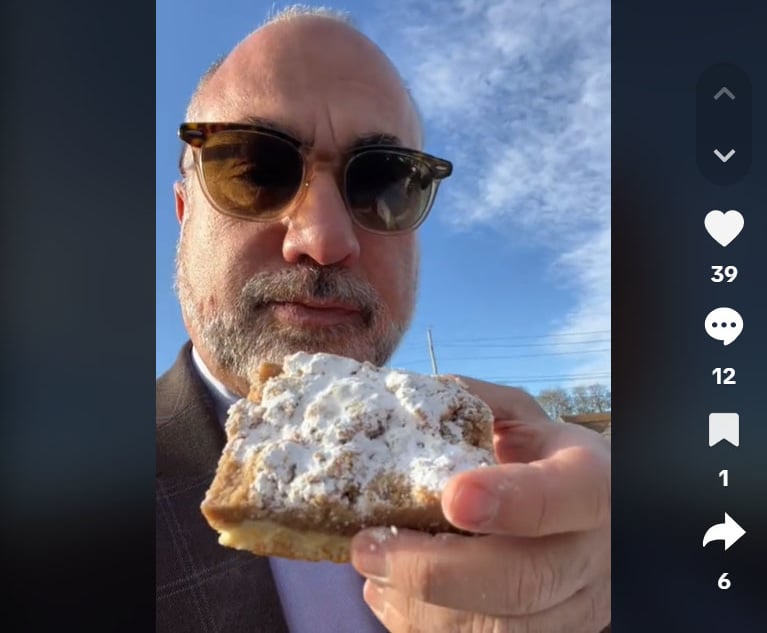Must Have or Nice to Have: Instagram for Lawyers
Attorneys who ignore Instagram do so not only at their own peril, they cede a comparative advantage to their competitors who are open to learning how to use this potent social tool.
December 02, 2019 at 12:00 PM
6 minute read
 Credit: PixieMe/Shutterstock.com
Credit: PixieMe/Shutterstock.com
As 2019 is about to be viewed through our collective rear-view mirror, the distinction narrows as to whether Instagram is a tool lawyers need to use or should simply consider using.
Instagram provides lawyers a rare and powerful opportunity to lead with images and follow with words, something uncommon and counterintuitive for people who have endured the inelastic process of a legal education. Attorneys who ignore Instagram do so not only at their own peril, they cede a comparative advantage to their competitors who are open to learning how to use this potent social tool.
Used well, Instagram is a series of repeated opportunities for lawyers to shed a new and different light on themselves and their practice. Through showing new sides on Instagram of who they are and wish to become as people and practitioners, lawyers can harness a powerful monetization tool for their practice. Through good Instagram hygiene, such as regular and consistent posting, and visual uniformity of one's feed, anyone who puts in the thought and effort can be an Instagram star to a growing audience.
"Used well" is an important descriptor. A 2018 Buzzfeed piece showed that Instagram has historically been the social medium most damaging to our psychological well-being. The reason is because much of Instagram is about crafting a fake persona—being someone that you simply aren't. But I would argue that this is changing, especially as more and more professionals embrace the platform as a professional tool. While skeptics may argue that authenticity on Instagram is a dull and transparent needle in a haystack of lies, they're missing the opportunity to convey elements of their true self to a virtual audience than can convert into real life acquaintances, friends and, for lawyers, clients.
These same skeptics may choose to stop reading here. And that's fine. But in mid-November, very young Kylie Jenner sold 51% of her very young cosmetics business to Coty for $600M. She built her $1.2B brand entirely upon the social currency that she created and curated. Many see the social media foundation for her success to have been Instagram.
So what can this mean for lawyers and their practice of law?
To find out for yourself, simply search a variety of lawyer-related hashtags on Instagram and see what legal personas are resonating with audiences. A few worthy of your attention are #lawyerstyle #womenlawyers #lawyerlife and #lawyersofinstagram. Do this search with an open mind and as you scroll through the images and the messages that accompany them, identify the points of intersection between what's resonating with audiences and resonating with you.
After having done this, you'll agree that it's surprising not only that the vast majority of lawyers don't use Instagram, but that many who do fail to envision paths to them becoming a micro-influencer through the platform.
The problem is how we see ourselves. All too often I hear lawyers bemoan that there's nothing exceptional about them, that they aren't interesting people. Then a moment later they tell me that they train and show champion poodles or are professional beekeepers who produce a highly desired strain of honey, precisely the kinds of things perfectly suited to develop and share an authentic and powerful Instagram presence.
But so what, you might ask. How does this investment of time, effort, and creativity monetize? The answer is simple. Given the wealth of choice clients have in seeking legal representation, don't you think that many of them would trust a lawyer who appears more human and humane to them? And given that many of the best and most powerful relationships develop over time, is it ever too early to use social media to begin to build a relationship with a future client?
It's honestly not difficult. Here's how to build an effective model of Instagram influence.
We start with you at the hub. What law schools never show you how to do, some business schools are beginning to, and almost every tech startup regularly does is build personas. Tech startups spend a lot of time building up detailed personas of who they believe will become their clients. You should spend an equal amount of time and effort considering what your clients want in a lawyer.
If one of your answers is empathy, consider how you can show this in a genuine way as a recurring theme in your Instagram feed. Is it highlighting work you do in the community, sports teams you coach, causes you embrace? You can create an organic win-win here, because as you build your audience and share insights about yourself, you inform and educate about meaningful things others might want to support.
As you continue to build your persona, think about what interests and passions the clients you want to attract might have. And here is a critically important point, and a somewhat nuanced one at that. If you are seeking to be a micro-influencer, is it better to show that you are an athlete or that you are a bodybuilder who eats a plant-based diet? Is it better to show that you enjoy dressing well or that you actively support and wear the designs of students and graduates of your city's design schools?
For too long, being genuine on social media meant making things generic. That's no longer the case. Because of how much Instagram has grown, any interest that you have, no matter how seemingly esoteric, is shared by others on the site. Whether you're a lawyer who writes K-Pop lyrics in their spare time, takes road trips only on local roads and never on the interstates, or collects microbrand watches, Instagram has your crowd.
Ask yourself one simple question: If you are in a position where you need to purchase a service from someone, are you more or less likely to purchase from someone who resonates with you? The Instagram equation is really that simple.
Whether you are building a solo practice, work in a small to medium firm, or are playing the snakes and ladders game of Big Law, you are a lawyer, a person, and a brand (if you choose to be). How many opportunities do we have in life to create our own persona from scratch? To hold out generally to the world and specifically to present and future clients literal images of how we wish to be perceived?
That's exactly what Instagram affords us. And with one billion monthly active users of the platform, it seems imprudent to ignore it.
Aron Solomon was the founder of LegalX at MaRS Discovery District in Toronto, one of the world's first legal technology accelerators. He is now based in Berlin, where he is the founder of Aron Brand and co-founder of Mission Watch Company. Aron also works with Next Level, developing new digital products.
|This content has been archived. It is available through our partners, LexisNexis® and Bloomberg Law.
To view this content, please continue to their sites.
Not a Lexis Subscriber?
Subscribe Now
Not a Bloomberg Law Subscriber?
Subscribe Now
NOT FOR REPRINT
© 2025 ALM Global, LLC, All Rights Reserved. Request academic re-use from www.copyright.com. All other uses, submit a request to [email protected]. For more information visit Asset & Logo Licensing.
You Might Like
View All
Tensions Run High at Final Hearing Before Manhattan Congestion Pricing Takes Effect
3 minute read

Appreciating the Important Work the Middlesex County Civil Bar Panel Does
7 minute read
Trending Stories
- 1Restoring Trust in the Courts Starts in New York
- 2'Pull Back the Curtain': Ex-NFL Players Seek Discovery in Lawsuit Over League's Disability Plan
- 3Tensions Run High at Final Hearing Before Manhattan Congestion Pricing Takes Effect
- 4Improper Removal to Fed. Court Leads to $100K Bill for Blue Cross Blue Shield
- 5Michael Halpern, Beloved Key West Attorney, Dies at 72
Who Got The Work
Michael G. Bongiorno, Andrew Scott Dulberg and Elizabeth E. Driscoll from Wilmer Cutler Pickering Hale and Dorr have stepped in to represent Symbotic Inc., an A.I.-enabled technology platform that focuses on increasing supply chain efficiency, and other defendants in a pending shareholder derivative lawsuit. The case, filed Oct. 2 in Massachusetts District Court by the Brown Law Firm on behalf of Stephen Austen, accuses certain officers and directors of misleading investors in regard to Symbotic's potential for margin growth by failing to disclose that the company was not equipped to timely deploy its systems or manage expenses through project delays. The case, assigned to U.S. District Judge Nathaniel M. Gorton, is 1:24-cv-12522, Austen v. Cohen et al.
Who Got The Work
Edmund Polubinski and Marie Killmond of Davis Polk & Wardwell have entered appearances for data platform software development company MongoDB and other defendants in a pending shareholder derivative lawsuit. The action, filed Oct. 7 in New York Southern District Court by the Brown Law Firm, accuses the company's directors and/or officers of falsely expressing confidence in the company’s restructuring of its sales incentive plan and downplaying the severity of decreases in its upfront commitments. The case is 1:24-cv-07594, Roy v. Ittycheria et al.
Who Got The Work
Amy O. Bruchs and Kurt F. Ellison of Michael Best & Friedrich have entered appearances for Epic Systems Corp. in a pending employment discrimination lawsuit. The suit was filed Sept. 7 in Wisconsin Western District Court by Levine Eisberner LLC and Siri & Glimstad on behalf of a project manager who claims that he was wrongfully terminated after applying for a religious exemption to the defendant's COVID-19 vaccine mandate. The case, assigned to U.S. Magistrate Judge Anita Marie Boor, is 3:24-cv-00630, Secker, Nathan v. Epic Systems Corporation.
Who Got The Work
David X. Sullivan, Thomas J. Finn and Gregory A. Hall from McCarter & English have entered appearances for Sunrun Installation Services in a pending civil rights lawsuit. The complaint was filed Sept. 4 in Connecticut District Court by attorney Robert M. Berke on behalf of former employee George Edward Steins, who was arrested and charged with employing an unregistered home improvement salesperson. The complaint alleges that had Sunrun informed the Connecticut Department of Consumer Protection that the plaintiff's employment had ended in 2017 and that he no longer held Sunrun's home improvement contractor license, he would not have been hit with charges, which were dismissed in May 2024. The case, assigned to U.S. District Judge Jeffrey A. Meyer, is 3:24-cv-01423, Steins v. Sunrun, Inc. et al.
Who Got The Work
Greenberg Traurig shareholder Joshua L. Raskin has entered an appearance for boohoo.com UK Ltd. in a pending patent infringement lawsuit. The suit, filed Sept. 3 in Texas Eastern District Court by Rozier Hardt McDonough on behalf of Alto Dynamics, asserts five patents related to an online shopping platform. The case, assigned to U.S. District Judge Rodney Gilstrap, is 2:24-cv-00719, Alto Dynamics, LLC v. boohoo.com UK Limited.
Featured Firms
Law Offices of Gary Martin Hays & Associates, P.C.
(470) 294-1674
Law Offices of Mark E. Salomone
(857) 444-6468
Smith & Hassler
(713) 739-1250






